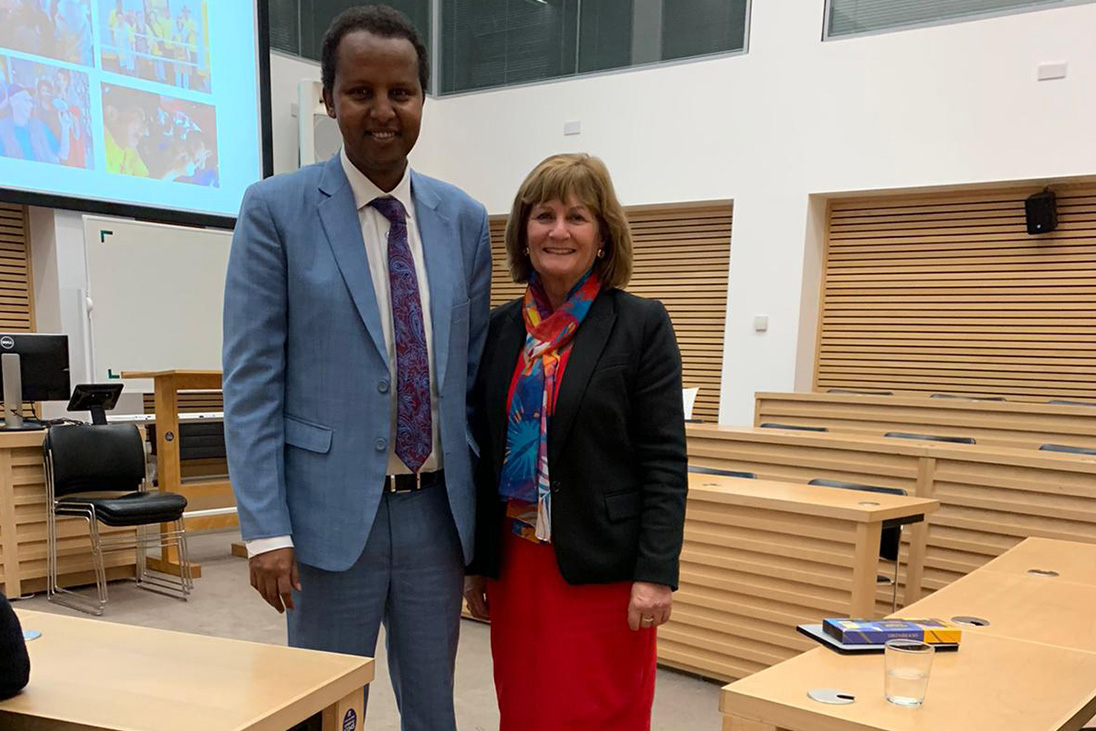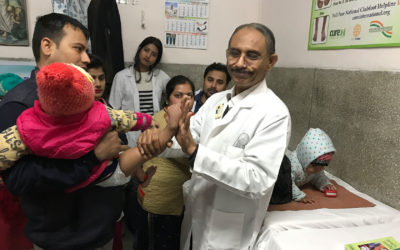If we can vaccinate every child, then we can end polio. That was the blunt message from one of the leading campaigners to eradicate polio in Pakistan.
Dr. Abdirahman Mahamud is the Polio Eradication Initiative National Team Leader for the World Health Organization in Pakistan – just one of two countries in the world where polio still has a strong foothold.
Over the past 25 years, the number of children affected by polio has declined from 2,600 cases in 1994 to 72 cases in 2019 in Pakistan and 16 cases in Afghanistan.
Speaking to Rotarians in Oxford, Dr. Mahamud reflected how some increases in cases can be linked to election periods.
Political campaigning and changes in administration mean that for seven to eight months, polio eradication becomes a secondary consideration for local district administrations, he explained.


Dr Abdirahman Mahamud, Pakistan’s National Team Leader for Polio Eradication at the World Health Organisation, alongside Judith Diment, a member of Rotary International’s PolioPlus Committee.
Other increases can be linked to the Taliban’s 2009 ban of vaccinations. He said: “We’ve seen dramatic improvement, but then we have also witnessed ups and downs during the last 15 years, which are related to the geo-political situation in the country.”
The key challenge, explained Dr. Mahamud, was to capture the missing children; those who were not receiving the valuable, life-saving polio vaccine.
He added: “If we can vaccinate every child then we can end polio. This has been achieved in countries such as Sudan, despite being a poor country and with ongoing conflict.
“Unfortunately, in Pakistan, it has not been possible to reach every child.
“Of the 167 districts in Pakistan, 11 are classed as high risk, and children are not always available when vaccinators visit homes. Over one million children were missed in one recent campaign.
“As long as we are missing these children, polio will fight.
“If we stop now, polio will make a devastating resurgence across the globe. We must #endpolio.” – @michelzaffran pic.twitter.com/YE8R0izX3M
— Rotary International (@Rotary) January 22, 2020
“It is a disease we are trying to eradicate and it’s trying to survive.
“It’s a competition between our efforts and the virus: wherever you have this vast majority of almost one million children who have not been vaccinated, polio will find them and we’ll end up with more cases.
“To interrupt polio, you need to reach 95% of the children, consistently, not one time, but every time when you do a campaign.”
Pakistan’s polio champion admitted that the scale of the campaign in his country is immense.
In the high risk polio areas, covering approximately 11 out of 67 districts, there are nine vaccination campaigns each year.
In total, around 40 million children are vaccinated five times each year by 260,000 frontline workers.
Communication is key, and the Pakistan Polio Eradication Initiative is re-thinking its communications strategy.
In the high risk areas of Pakistan, where there are the nine vaccination campaigns in a year, each vaccinator who visits a family with children under five-years-old is followed by monitors and supervisors, and this has been part of the quality assurance processes.
However, it is recognised that this approach can alienate and irritate people.
Repeated knocks on the door can lead to refusals by parents, so the plan is to change the approach and have just vaccinators visiting homes.
To achieve this, the campaign was halted from September through to November to enable the polio eradication teams to build layers of trust through the communities.
PAKISTAN Polio Plus Committee Chair @azizmemonkings meets Health Minster @zfrmrza today. And discussed strategies and plans for upcoming Polio eradication campaigns in all around the country. @PakFightsPolio @EndPolioNow pic.twitter.com/DmJbupCR2t
— Rotary Pakistan 🇵🇰 (@RotaryPakistan) November 4, 2019
It was also hoped this cooling off period would help to build alliances beyond the Global Polio Eradication Initiative members: Rotary International, World Health Organization, UNICEF, Centers for Disease Control and the Bill & Melinda Gates Foundation.
If we can vaccinate every child, then we can end polio.”
Dr. Mahamud admitted with so much attention focussed on polio, some of these communities might view these frontline workers as the only representatives of the government, fixed on polio, but without making reference to clean water and sanitation.
Politicians have been visiting these communities to hear these concerns, while both the Prime Minister Imran Khan, and the Chief of the Army, Qamar Javed Bajwa, have given their commitment to polio eradication as a priority.
“At the highest levels of the government, there is commitment to finish the job of polio eradication,” added Dr. Mahamud.
And what about social media?
In April 2019 in Pakistan, 35,000 school age children were admitted to hospital, with rumours that the polio vaccine had made them sick.
This was an example of panic on social media and led to parents closing their doors on vaccinators. The polio teams are coming up with solutions for Facebook and Twitter fake news and scaremongering, with help from the platforms themselves.
Dr. Mahamud revealed that they were working with Facebook to shut down anti-vaccination sites. However, the mobile phone communications application, WhatsApp, remains a challenge because of its encrypted access.
Independent monitoring of polio can help Pakistan’s anti-polio drive, says @drsafdar64
Written By @Benazir_Shah
A very fruitful article. https://t.co/XUn3UQZk4v— Rotary Pakistan 🇵🇰 (@RotaryPakistan) January 17, 2020
Polio remains a disease of marginalisation and inequality.
Pakistan faces a moral dilemma of investing millions in the vaccination for one disease, when there are still cases of diarrhoea and malnutrition, along with poor water supplies and sanitation.
The Pakistan government, Rotary and other aid organisations are supporting improvements to the nation’s water supply with initiatives such as solar filtration systems.
Rotary is seen as a local organisation. So when some communities have viewed the vaccinations with suspicion, Rotary is able to cross that divide”.
Dr. Mahamud is full of admiration for the work conducted by Rotarian volunteers in Pakistan, led by Aziz Memon, Chair of Rotary’s Pakistan PolioPlus Committee.
Aziz is a successful businessman, but he has also led on advocacy and built good relationships with many politicians.
Dr. Mahamud pointed out how Rotary funds billboards across all of Pakistan’s major bus stations and railways to promote End Polio Now.
Rotarians, he said, have been in the frontline, yet it hasn’t been easy to push the polio agenda in a difficult economic climate.
“I really want to take this time to appreciate the excellent work of Aziz Memon and the Rotarians of Pakistan,” added Dr. Mahamud.
Rotary is seen as a local organisation. So when some communities have viewed the vaccinations with suspicion, Rotary is able to cross that divide.
Similarly, the Army is viewed with respect so, when the Army has been involved in vaccinations, providing security support for health workers, this has helped to improve community acceptance.
For more information visit: www.endpolio.com.pk/


























































